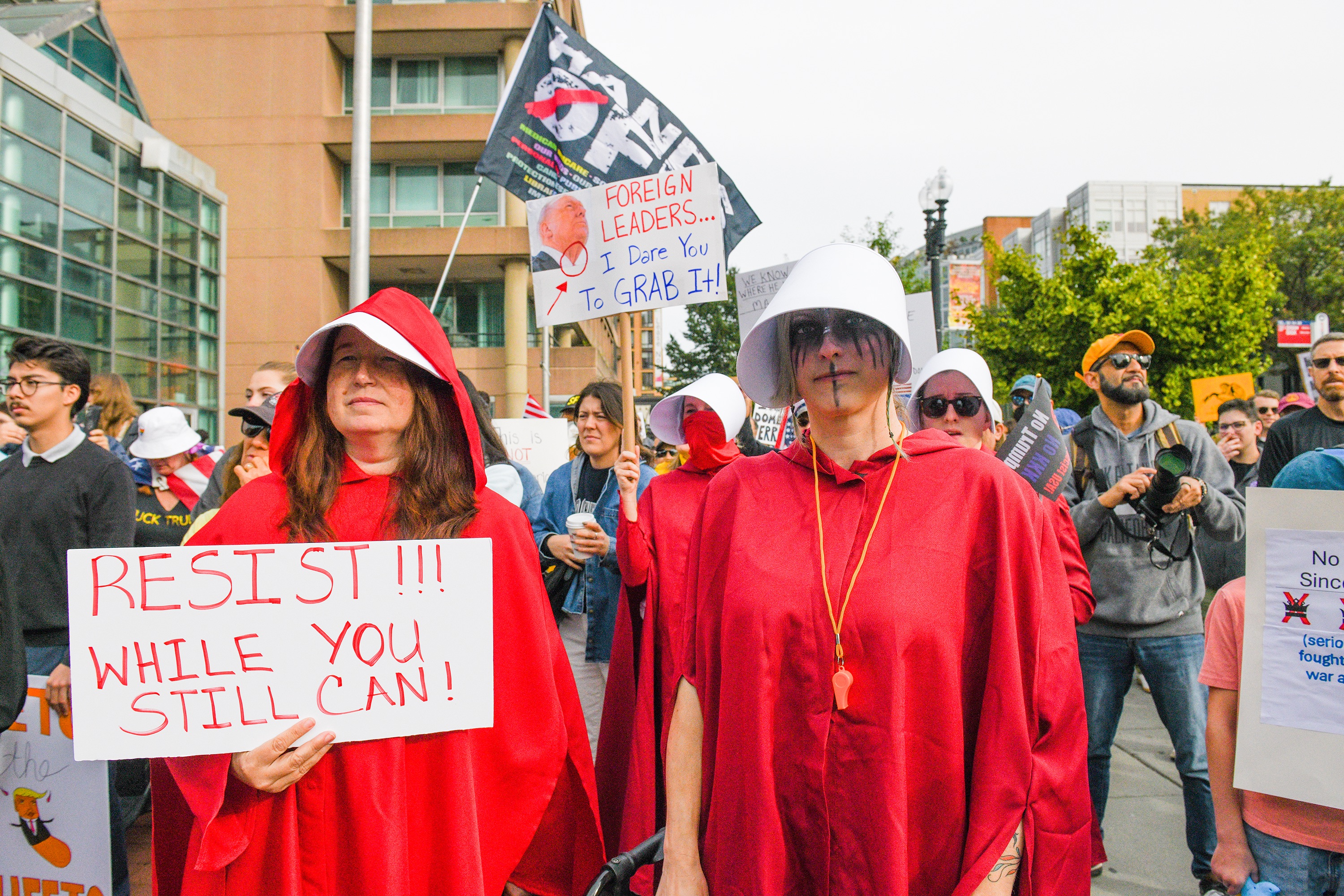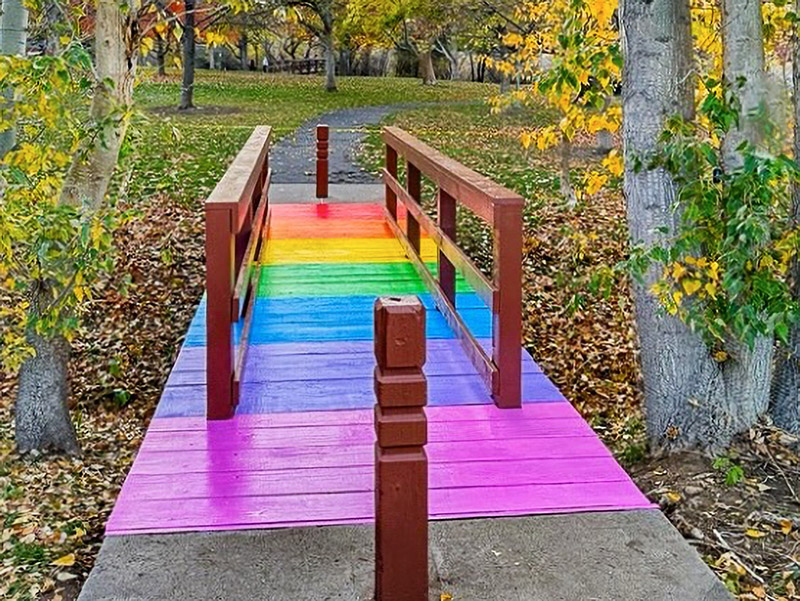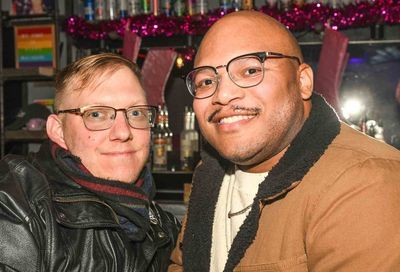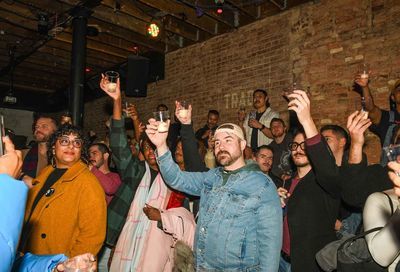The 2020 Election: LGBTQ Candidates Win Big
On Election Day, LGBTQ voters showed up in droves, helping LGBTQ candidates win several historic victories.

The United States of America continued to prove it is a divided country, as the presidential election result was too close to call and hinged on about seven remaining states. Donald Trump’s campaign successfully turned out Republican-leaning voters in nearly every state while substantial numbers of Democratic-leaning voters were missing in action.
As of Wednesday afternoon, former Vice President Joe Biden led President Donald Trump by a 253 to 213 margin in the Electoral College, and was holding onto narrow leads in Nevada and Arizona, while Trump was ahead in Georgia, North Carolina, and Pennsylvania.
Due to the shifts and swings in vote tabulations, which themselves were caused by Democrats almost universally voting via mail before Election Day, and Republicans generally preferring to vote in person, it is likely that some of the results from the final states will be challenged in court.
In a widely criticized press conference in the early morning hours of Wednesday, Trump claimed that he was headed to a resounding victory, had won the remaining states in question, and accused Democrats of trying to steal the election through fraudulent ballots. He promised to challenge the results in the Supreme Court to demand that states stop counting any remaining mail-in ballots that had not been tabulated by midnight.
Yet despite the uncertainty at the presidential level — and what that may or may not portend for LGBTQ rights nationally — there were some significant wins for LGBTQ candidates on Tuesday night.
In Congress, the LGBTQ caucus looks like it will grow its membership by two, increasing from seven to nine members following the victories of New Yorkers Ritchie Torres and Mondaire Jones. Both will become the first two openly gay Black men elected to Congress, and Torres will become the first openly gay Afro-Latino person to head to Washington.
Torres and Jones overcame significant odds in the June 23 primary, going from underdogs to clear winners by running on unabashed progressive platforms focused on doing right for ordinary citizens struggling to get by. Both men grew up in working-class families, and have prioritized — in addition to providing financial relief to people suffering from the COVID-19 pandemic — legislation that will create jobs, especially in the “green” economy, ensure better wages for working people, shore up social “safety net” programs, and ensure equal opportunities for every American.
Jones, who beat Republican Maureen McArdle Schulman on Tuesday, told Metro Weekly in an interview earlier this year that he had to overcome many obstacles, including latent racism from members of the LGBTQ community, in his bid for the Democratic nomination.
“I’ve experienced more racism than I’ve experienced homophobia on the campaign trail, including from the white gay community,” Jones said. “I definitely remember calling a prospective donor who holds himself out to the world as being a leader in the gay community, and asking him for a contribution, and before I could even introduce myself to him, he’s telling me that he wishes he could support me, but he does not believe that I can serve my black religious community and the gay community at the same time. Which was extraordinary, because I rarely go to church.”
Read: Our August 2020 cover interview with Mondaire Jones
Following his primary win, Torres established a reputation as a “giant slayer” after defeating an anti-LGBTQ, pro-Trump Democrat with longstanding ties to the community in the primary, as well as another candidate who received the backing of the Congressional Black Caucus. He’s prepared to take that fighting spirit to Congress and work to better the lives of people in his district, particularly marginalized populations or society’s more vulnerable members.
“When I think about all the struggles affecting the poorest parts of our country, whether it be poverty or inequality, food insecurity or housing, these are not only abstractions that I studied intensely as a policy, these are struggles that I’ve lived in my own life,” Torres said. “For me, policy is personal.”
Read: Our September 2020 cover interview with Ritchie Torres
Annise Parker, the president and CEO of the LGBTQ Victory Fund, celebrated the two men’s victories, saying they have “shattered a rainbow ceiling and will bring unique perspectives based on lived experiences never before represented in the U.S. Congress.”
In a statement, she wrote, “As our nation grapples with racism, police brutality and a pandemic that disproportionately affects people of color and LGBTQ people, these are the voices that can pull us from the brink and toward a more united and fair society. Their elections will end any doubts about the electability of Black LGBTQ men to our nation’s highest legislative body. It will also inspire more young LGBTQ leaders and leaders of color to run and serve.”
David Johns, the executive director of the National Black Justice Coalition, told Metro Weekly he was “proud” of both men.
“I understand the importance of representation,” he said. “There are so few representations of my queer, trans and non-binary people in so many spaces, including in federal elected offices. I believe the two of them will affirm younger, black, Latinx, queer, trans and non-binary people, who need to understand that their voices, their energy, their spirit, their investment and involvement and electoral politics is necessary and important.
“The National Black Justice Coalition has spent so much time and energy reminding elected officials that people with intersectional identities exist and the things that matter to us most are often neglected and ignored. And so I look forward to the two of them advancing agendas that understand that nuance, and center it, in the pursuit of leveraging federal resources and other resources to support the needs of constituents and communities throughout the country.”
Meanwhile, at the state level, LGBTQ candidates continued to make gains, with several candidates celebrating a number of historic wins.
At the state level, in Delaware, transgender rights and health care activist Sarah McBride became the first openly trans person in the United States elected to a state Senate seat, after winning her Wilmington area race on Tuesday.
Read: Sarah McBride on her historic state Senate win in Delaware
McBride, who serves as national press secretary for the Human Rights Campaign, won Delaware’s 1st State Senate district, besting her Republican opponent Steve Washington, 73% to 27%.
“I hope tonight shows an LGBTQ kid that our democracy is big enough for them, too,” McBride said in her victory speech. “As Delaware continues to face the COVID crisis, it’s time to get to work to invest in the policies that will make a difference for working families.”

The LGBTQ Victory Fund, which had backed McBride’s bid for office, called her victory “a powerful testament to the growing influence of transgender leaders in our politics and gives hope to countless trans people looking toward a brighter future.”
In Florida, State Rep. Shevrin Jones, a Florida Democrat, became the first openly gay state senator to be elected in the Sunshine State. Jones won an open State Senate seat in South Florida after a contested primary that he won in August. He will be one of only two out LGBTQ Black men serving in state senates in the United States, along with State Senator-elect Jabari Brisport of New York.
Jones became the target of anti-gay robotexts earlier this year after he revealed to local reporters that, following his diagnosis with and recovery from COVID-19, he had been turned away from donating plasma due to the Food & Drug Administration’s restrictions on gay and bisexual male donors, which require a gay or bi man to be abstinent for at least three months before donating.
After that story went viral, voters in Jones’ district began receiving anti-gay robotexts saying: “The Miami Herald reported that Shevrin Jones was discriminated against for recent homosexual contact,” and directed people to a fake website. But there was a backlash: Jones ended up winning his primary handily.
Also in Florida, Michele Rayner-Goolsby became the first out LGBTQ Black woman elected to a seat in the Florida House of Representatives. Rayner-Goolsby, who describes herself as an “unapologetic Black woman,” was unopposed in the general election. In a release after she won the Democratic primary in August, Rayner-Goolsby said her victory represented “a new day.”
“We’ve run a campaign focused on putting people over politics and that’s rooted in a commitment to working with and for residents until the change they seek is a reality,” she said. “This win proves that this community is…tired [of] business as usual and ready for change, and I’m so grateful and humbled that the voters of District 70 have elected me to represent them in Tallahassee to move us closer to the change we all deserve.”
Episcopal priest Kim Jackson, became the first openly LGBTQ person elected to the Georgia Senate, and only the third openly LGBTQ Black women state senators in the nation.
“Kim shattered a lavender ceiling and is paving the way for a state government that is more representative of the people it serves,” Victory Fund’s Parker said in a statement. “As an Episcopal priest, Kim can diffuse legislators who claim religion as the reason they oppose equality and will make clear that many LGBTQ people are of faith too. While Georgia lags nearly every state in the nation in protections for LGBTQ people, Kim’s victory ensures our community has a voice at the table and gives hope that more are on the way.”
Out in the Pacific Ocean, Adrian Tam became the first openly LGBTQ person elected to the Hawaii State Legislature when he won the District 22 seat in the state House of Representatives. Tam’s victory was notable not only for its size — dispatching his opponent 68% to 32% — but because he defeated Nicholas Ochs, the leader of the Hawaii Proud Boys, the neo-Nazi extremist group promoted by President Donald Trump during the first presidential debate.
In Kansas, Stephanie Byers became the first transgender person ever elected to its State House of Representatives and the first out trans person of color ever elected to a state legislature in the United States. Currently, there are four out transgender women serving in state legislatures: Virginia’s Danica Roem, Colorado’s Brianna Titone, and New Hampshire’s Gerri Cannon and Lisa Bunker. When she is sworn in, Byers will become the fifth transgender person serving in a lower state legislative chamber.
Byers, who is Native American, will also be the first indigenous LGBTQ person elected to a state legislature and the third openly LGBTQ person ever elected to the Kansas State Legislature, following State Reps. Susan Ruiz and Brandon Woodward.
Byers told The Wichita Eagle that she understands the significance of her win.
“For a lot of folks, if Kansas, the big red Republican state, can elect a trans person to a state legislator, the doors open up in a lot of other places for people,” she said. “And it helps those people who are transgender to reinforce that they are people who matter, they are people who are important and they’re people who can be successful in their lives.”

In Ohio’s Cincinnati area, Charmaine McGuffey, who touted her LGBTQ identity in an ad to demonstrate the obstacles and bigotry she had to overcome, won her race for Hamilton County Sheriff. McGuffey, a former sheriff’s deputy, previously unseated the incumbent sheriff who had fired her in the Democratic primary earlier this year. She campaigned on a platform that included reforming the criminal justice system, ensuring officers are not abusing their power, and fighting homophobia and sexism within the sheriff’s office.
“I know what it feels like to be targeted. I absolutely do,” McGuffey said in a press conference following her win. “I know what it feels like to be the only woman in the room. To be the only LGBT woman in the room. And what I’ve seen in my career is a system that does not allow diversity in the upper echelon and ranks of the department. And we need that here in Cincinnati, we need that here in Hamilton County.”
Mauree Turner made history in her race for Oklahoma’s State Senate, becoming the first openly non-binary person ever elected to a state legislature in the country. Currently, there are only four genderqueer or non-binary elected officals in the entire country, and just five LGBTQ elected officials in all of Oklahoma.
“Of all the states to achieve a milestone political moment for non-binary people, few would have thought it would be Oklahoma, where there are so few LGBTQ elected officials,” Parker said in a statement. “But Mauree ran a tireless campaign focused on the issues that matter to their district while also being authentic and open about who they are.”
History was also made in Tennessee, after Torrey Harris and Eddie Mannis won their elections for the Tennessee State House, becoming the first two openly LGBTQ people ever elected to the state legislature. Harris, a Democrat, was elected with 77% of the vote, while Mannis, a Republican, won 55% of the vote. A third out candidate, Brandon Thomas, was trailing in an uncalled race as of press time.
Prior to Tuesday night, Tennessee was one of just five states in the nation to have never elected an openly LGBTQ person to its state legislature, and there are only eight LGBTQ elected officials serving at any level of government in the entire state.
“Twin victories secured a long-elusive political milestone in Tennessee and will pave the way for a more representative state legislature next year,” said Parker. “Both Torrey and Eddie sent a clear message that LGBTQ candidates can win in a deep red state while being their authentic selves. Their presence in the state legislature can dilute the most toxic anti-LGBTQ voices and lead to more inclusive legislation.”
In another win for transgender representation, Taylor Small became the first out transgender person ever elected to the Vermont state legislature, bringing the number of openly trans State House members to six, along with the victory of Stephanie Byers in Kansas.
Even in Washington, D.C., LGBTQ candidates found some success. While some fell short in races for the Council, Allister Chang, an openly gay man, was elected to the open Ward 2 seat on the State Board of Education. Additionally, 33 of 47 LGBTQ candidates seeking two-year terms as Advisory Neighborhood Commissioners emerged victorious, winning seats in seven of the city’s eight wards.
Sarah Kate Ellis, the president and CEO of GLAAD, celebrated the various victories for LGBTQ candidates.
“Tonight’s wins for LGBTQ people of color and transgender Americans across the country are historic and long overdue,” she said in a statement. “Their victories represent a leap forward for LGBTQ acceptance and a demand for more of the progress and equality that their very presence demonstrates. We can’t wait to see them shine in their new roles.”
LGBTQ voters also set a record for voter turnout in this year’s election, showing up in numbers nearly double their proportion of the population.
According to the National Election Pool exit poll by Edison Research, LGBTQ-identifying people made up 7% of the electorate, despite comprising only 4.5% of the total adult population. This marks the third overperformance in a row for LGTBQ voters, who improved upon their higher-than-average turnout in 2018 and 2016.
“Over the last three elections, the share of LGBTQ voters has continued to increase, solidifying our community as a key rising constituency that politicians must court,” Alphonso David, the president of the Human Rights Campaign, said in a statement. “Our issues matter, our votes matter and politicians around the country have taken notice. But this development did not occur in a single cycle. Over the last two decades, and especially over the last four years, our community has organized to protect our rights — rights that have been under attack and on the ballot.
“In the most consequential election of our lifetimes, LGBTQ people showed our strength.”
Support Metro Weekly’s Journalism
These are challenging times for news organizations. And yet it’s crucial we stay active and provide vital resources and information to both our local readers and the world. So won’t you please take a moment and consider supporting Metro Weekly with a membership? For as little as $5 a month, you can help ensure Metro Weekly magazine and MetroWeekly.com remain free, viable resources as we provide the best, most diverse, culturally-resonant LGBTQ coverage in both the D.C. region and around the world. Memberships come with exclusive perks and discounts, your own personal digital delivery of each week’s magazine (and an archive), access to our Member's Lounge when it launches this fall, and exclusive members-only items like Metro Weekly Membership Mugs and Tote Bags! Check out all our membership levels here and please join us today!



























You must be logged in to post a comment.